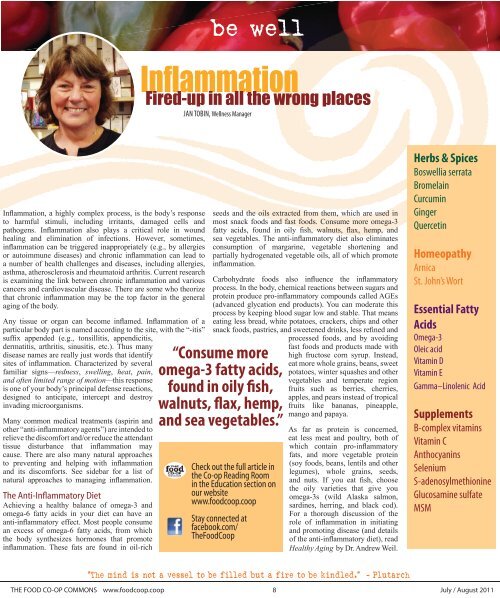THE FOOD CO-OP - Port Townsend Food Co-op
THE FOOD CO-OP - Port Townsend Food Co-op
THE FOOD CO-OP - Port Townsend Food Co-op
Create successful ePaper yourself
Turn your PDF publications into a flip-book with our unique Google optimized e-Paper software.
Infl ammation, a highly complex process, is the body’s response<br />
to harmful stimuli, including irritants, damaged cells and<br />
pathogens. Infl ammation also plays a critical role in wound<br />
healing and elimination of infections. However, sometimes,<br />
infl ammation can be triggered inappr<strong>op</strong>riately (e.g., by allergies<br />
or autoimmune diseases) and chronic infl ammation can lead to<br />
a number of health challenges and diseases, including allergies,<br />
asthma, atherosclerosis and rheumatoid arthritis. Current research<br />
is examining the link between chronic infl ammation and various<br />
cancers and cardiovascular disease. There are some who theorize<br />
that chronic infl ammation may be the t<strong>op</strong> factor in the general<br />
aging of the body.<br />
Any tissue or organ can become infl amed. Infl ammation of a<br />
particular body part is named according to the site, with the “-itis”<br />
suffi x appended (e.g., tonsillitis, appendicitis,<br />
dermatitis, arthritis, sinusitis, etc.). Thus many<br />
disease names are really just words that identify<br />
sites of infl ammation. Characterized by several<br />
familiar signs—redness, swelling, heat, pain,<br />
and often limited range of motion—this response<br />
is one of your body’s principal defense reactions,<br />
designed to anticipate, intercept and destroy<br />
invading microorganisms.<br />
Many common medical treatments (aspirin and<br />
other “anti-infl ammatory agents”) are intended to<br />
relieve the discomfort and/or reduce the attendant<br />
tissue disturbance that infl ammation may<br />
cause. There are also many natural approaches<br />
to preventing and helping with infl ammation<br />
and its discomforts. See sidebar for a list of<br />
natural approaches to managing infl ammation.<br />
The Anti-Infl ammatory Diet<br />
Achieving a healthy balance of omega-3 and<br />
omega-6 fatty acids in your diet can have an<br />
anti-infl ammatory effect. Most pe<strong>op</strong>le consume<br />
an excess of omega-6 fatty acids, from which<br />
the body synthesizes hormones that promote<br />
infl ammation. These fats are found in oil-rich<br />
be well<br />
Infl ammation<br />
Fired-up in all the wrong places<br />
JAN TOBIN, Wellness Manager<br />
seeds and the oils extracted from them, which are used in<br />
most snack foods and fast foods. <strong>Co</strong>nsume more omega-3<br />
fatty acids, found in oily fi sh, walnuts, fl ax, hemp, and<br />
sea vegetables. The anti-infl ammatory diet also eliminates<br />
consumption of margarine, vegetable shortening and<br />
partially hydrogenated vegetable oils, all of which promote<br />
infl ammation.<br />
Carbohydrate foods also infl uence the infl ammatory<br />
process. In the body, chemical reactions between sugars and<br />
protein produce pro-infl ammatory compounds called AGEs<br />
(advanced glycation end products). You can moderate this<br />
process by keeping blood sugar low and stable. That means<br />
eating less bread, white potatoes, crackers, chips and other<br />
snack foods, pastries, and sweetened drinks, less refi ned and<br />
processed foods, and by avoiding<br />
fast foods and products made with<br />
“<strong>Co</strong>nsume more<br />
omega-3 fatty acids,<br />
found in oily sh,<br />
walnuts, ax, hemp,<br />
and sea vegetables.”<br />
Check out the full article in<br />
the <strong>Co</strong>-<strong>op</strong> Reading Room<br />
in the Education section on<br />
our website<br />
www.foodco<strong>op</strong>.co<strong>op</strong><br />
Stay connected at<br />
facebook.com/<br />
The<strong>Food</strong><strong>Co</strong><strong>op</strong><br />
high fructose corn syrup. Instead,<br />
eat more whole grains, beans, sweet<br />
potatoes, winter squashes and other<br />
vegetables and temperate region<br />
fruits such as berries, cherries,<br />
apples, and pears instead of tr<strong>op</strong>ical<br />
fruits like bananas, pineapple,<br />
mango and papaya.<br />
As far as protein is concerned,<br />
eat less meat and poultry, both of<br />
which contain pro-infl ammatory<br />
fats, and more vegetable protein<br />
(soy foods, beans, lentils and other<br />
legumes), whole grains, seeds,<br />
and nuts. If you eat fi sh, choose<br />
the oily varieties that give you<br />
omega-3s (wild Alaska salmon,<br />
sardines, herring, and black cod).<br />
For a thorough discussion of the<br />
role of infl ammation in initiating<br />
and promoting disease (and details<br />
of the anti-infl ammatory diet), read<br />
Healthy Aging by Dr. Andrew Weil.<br />
“The mind is not a vessel to be filled but a fire to be kindled.” - Plutarch<br />
Herbs & Spices<br />
Boswellia serrata<br />
Bromelain<br />
Curcumin<br />
Ginger<br />
Quercetin<br />
Home<strong>op</strong>athy<br />
Arnica<br />
St. John’s Wort<br />
Essential Fatty<br />
Acids<br />
Omega-3<br />
Oleic acid<br />
Vitamin D<br />
Vitamin E<br />
Gamma–Linolenic Acid<br />
Supplements<br />
B-complex vitamins<br />
Vitamin C<br />
Anthocyanins<br />
Selenium<br />
S-adenosylmethionine<br />
Glucosamine sulfate<br />
MSM<br />
<strong>THE</strong> <strong>FOOD</strong> <strong>CO</strong>-<strong>OP</strong> <strong>CO</strong>MMONS www.foodco<strong>op</strong>.co<strong>op</strong> 8 July / August 2011


